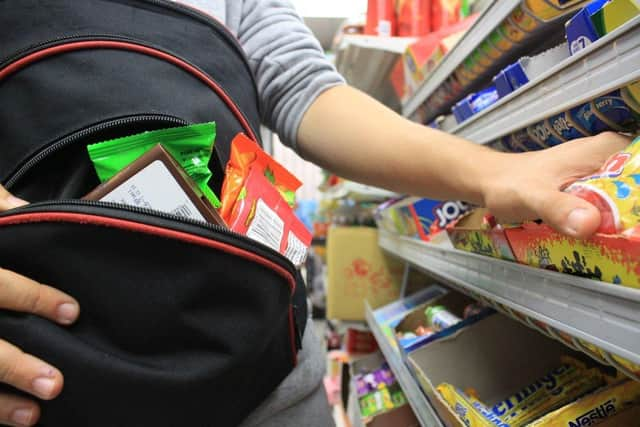Excessive displays of wealth and cronyism by Tories put shoplifting by hungry people in context – Aidan Smith
I still regret it, and the dent in profits caused to my friendly neighbourhood branch of Woolies. However miniscule, it must have contributed to the store chain’s ultimate demise. After all, weren’t the estimable FW Woolworths offering to educate me in the ways of junior-level satire? Filling their rotating book displays with paperback spin-offs from Mad magazine, which poked fun at Hollywood self-importance and White House buffoonery? And how did I repay them? By not paying and nicking the books. Stuffing them up my school jumper. The one with the motto: “Truth will prevail.”
It wasn’t big and it wasn’t clever and my guilt has only been mildly assuaged by my wife’s shoplifting confession from childhood, an eraser in the shape of a lipstick which on an outing into town with her mother she hid in her pants. It stayed there all through tea, right up to bathtime. “I tried to get into the bath in my pants, the rubber still there, so must have accepted I’d done wrong and wanted Mum to find out. She marched me back to the shop the next day to be given a sound ticking-off.”
Advertisement
Hide AdAdvertisement
Hide AdSilly middle-class kids might have stolen for a dare, for the thrill, to appear cool, as a rite-of-passage or, not actually needing to do it, because of what Pink Floyd called a momentary lapse of reason. Silly middle-class men might even try and advance the argument: “Could it really be termed stealing if you were availing yourself of… books?” But today it is not really something to joke about. Not when it prompts headlines like: “Once a nation of shopkeepers, we’ve become one of shoplifters.”


There are stories about shoplifting almost every day. Yesterday the embattled boss of a Hampshire chain of Co-op supermarkets claimed that, with police apparently insisting on the thief’s full name, clear CCTV of the robbery, and confirmation of the stolen items having a value of more than £200, shoplifting had become “essentially decriminalised”.
The most recent stats from forces in England, Wales and Northern Ireland show a year-on-year 33 per cent increase in shoplifting. In Scotland, the figure is 25 per cent.
The boss of John Lewis, Dame Sharon White, has disclosed details of incidents at Scottish branches of the UK’s most emblematic store which must have shocked regular customers. When a group of teenage boys unsuccessfully tried to raid the tech department of the Glasgow outlet, they promptly descended on the Edinburgh branch. While attempting to steal expensive fragrances, there was an altercation with security staff and a shopper who intervened was hurt.
Were the perfumes intended as gifts for the boys’ mothers? Or would they have gone straight onto eBay? The reasons behind the sudden, dramatic surge in shoplifting are unclear because only five per cent of the perpetrators end up in court, but surely the cost-of-living crisis is a major factor.
Look at what else is being stolen: baby formula, laundry tablets, teabags. Coffee and dishwasher liquid is having to be locked down. Only single steaks are being put on display in Marks & Spencer. Those ketchup bottles are most likely dummies. Razors are being security-tagged, also butter and even cheap chocolate bars. There’s not much that’s bearing a Chanel or Hermes label or which might be destined for resale. An average shopping basket, in other words. For an average household. In distinctly unaverage times.
Some of the shoplifting is the work of organised gangs. The culprits can be audacious and aggressive, which is horrible for staff, particularly in smaller stores where there’s less security, if any. Some of the shoplifting may involve those able to pay but who get a kick out of crime. And some of the shoplifting will almost certainly include others who can pay but adhere to the view: “Everyone’s doing it so I’m not going to miss out.”
But what about those who can’t pay? Who probably use food banks but they’re not enough? The leading network of these sadly vital facilities, the Trussell Trust, reports that the number of people in the UK who faced hunger last year was 11.3 million. There should never be prosecutions for those in such dire straits and who believe that, for their very survival, there’s no other option but to steal basic items. But one reason a lack of prosecutions could be deemed unfortunate is that we don’t get to hear the pleas of mitigation. They might be interesting, don’t you think? Probably cast a long shadow over what is still, just about, called society. And amount to pretty uncomfortable listening for those in power.
Advertisement
Hide AdAdvertisement
Hide AdWith the help of a sharp lawyer, cases for the defence could point to the lack of proper leadership from Westminster, and proper probity over finances. The spending on birthday cakes could be highlighted. On wine which needed suitcases to lug it back to 10 Downing Street. On £840-a-roll gold wallpaper or on £490 Prada loafers (the cost of which didn’t come from the public purse but hardly helped the all-in-this-together vibe). On private jets. On £8.7 billion worth of PPE, found to be completely useless. On, lest we forget, the £30 billion required to shore up the economy after the disastrous “Kami-Kwaze” mini-budget. And – this just in – on the £330 daily allowance for a former Boris Johnson aide, just turned 30, to sit in the House of Lords for the rest of her life.
“I’m sorry, your honour, but I found all of this overwhelming. Also underwhelming. I could afford the pint of milk, it’s true, but not the Wagon Wheels. They’re on the Tories.” What was it Morrissey said again? His politics may have since oscillated wildly, to quote a different Smiths’ song, but this sentiment remains valid: Shoplifters of the world unite.